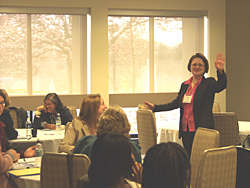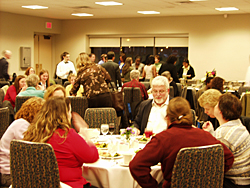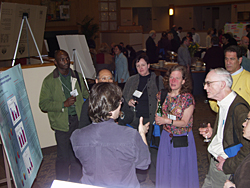Participants discussed instructional topics, including course design, collaborative learning, problem-based learning, and active student engagement, the pedagogically sound use of clickers and documentation of teaching effectiveness.
The conference also offered participants an informal forum to share what works in their courses, explore alternative teaching approaches and network with colleagues across disciplines.
As Wilkey Wong, a UD doctoral student in education, said, “What constituted the essence of the conference for me was faculty hashing out both practical and theoretical ideas on student learning. The discussions were vibrant and just drew you in. It made me feel connected to others who value teaching and validated in my academic career goal.”
This year's event was preceded by a special professional development event for graduate students focused on the journey from graduate student to faculty or professional. Close to 60 students participated in an interactive panel session that took a closer look at issues pertaining to post-graduate professionals.
“Graduate students are important members of the academic community. In addition to supporting faculty in their teaching, many teach their own courses. They also represent the future of academe, and it's most fitting to advance their professional development in this educative forum,” Spencer Benson, director of the Center for Teaching Excellence at the University of Maryland, said. The event was co-sponsored by the University of Maryland and UD's Office of the Provost.The conference featured 48 concurrent sessions and 21 poster presentations addressing innovative teaching and classroom research. All proposals underwent a blind peer review by three independent reviewers from a range of institutions.
The following University of Delaware faculty and graduate students contributed:
- Deborah Allen, biological sciences, Hal White, chemistry and biochemistry, and George Watson, associate dean, College of Arts & Sciences--"Problem-Based Learning: Real World Problems as Blueprints for Learning";
- Gabriele Bauer, Center for Teaching Effectiveness, and Catherine Ross, University of Connecticut--"Learning from Students: Aligning Our Teaching and Their Learning";
- Ralph Begleiter, communication--"Capturing Their Minds in Class: Harnessing Image Power to Reach Visually-Oriented Undergrads";
- LeeAnn Cardaciotto, Carrie Smith, Matthew Shaffer and Jocelyn Jones, psychology--"Effects of Active Learning Activities On Student Retention, Engagement, And Attitudes In Large Introductory Psychology Classes" (poster);
- Laura Eisenman, Gary Allison and Amy Pleet, education--"Practicing What We Preach: Engaging Future High School Teachers In Problem-Based Learning" (poster);
- Beth Morling, psychology--"'You Must be Smart!' Psychological Research Can Inform Daily Practices in the College Classroom";
- Nancy O'Laughlin, IT-User Services--"Taking the Guesswork Out of Using Clickers!";
- Christopher Penna and James Dean, English--"Wiki Work: Using Wikis for Collaborative Undergraduate Research";
- Kathleen Pusecker and Emily Smith, Office of Educational Assessment--"Fishing on the Fly: Reeling in the Responses";
- William Rivers, English--"Teaching Standards for Assessing the Credibility of Internet Sources: An Interactive Case Study";
- Carrie Smith and LeeAnn Cardaciotto, psychology--"Actively Learning About Active Learning";
- Bahira Trask, Barbara Settles, Michelle Knight and Bethany Willis Hepp, Individual and Family Studies--"Globalizing the Classroom: Using International Case Studies To Enhance Student Learning" (poster);
- Penny Rodrick-Williams, entomology and wildlife ecology--Implementing a Service-Learning Project In An Introductory Wildlife Course: Getting Students Excited And Prepared For The Future" (poster);
- Jeffrey Spraggins, chemistry and biochemistry--"Learning by Teaching: Using Self-Explanation and Reciprocal Peer Teaching in the Laboratory" (poster);
- James Wingrave, Bridget Brennan and Julie Lloyd, chemistry and biochemistry--"Activating Non-Major Brains Prior to General Science Labs".
“Conference attendance has grown significantly from last year, and this growth reflects institutions' focus on quality student learning and teaching, and their support of faculty,” Gabriele Bauer, assistant director of the Center for Teaching Effectiveness and conference planner, said.
“We were very pleased by the high quality sessions and inspired by the pedagogical leadership of internationally recognized experts such as Peter Seldin, Milton Cox, Barbara Millis and Laurie Richlin. It's a gift to sit around the table with these talented colleagues, have their utmost attention, and talk teaching,” Bauer said.
Based on the participant feedback, the conference met the participants' needs and in many instances exceeded their expectations. One attendee remarked, “We are planning a faculty learning community on using film for next fall, and the ideas gained at Lilly will be most helpful.” Another participant said, “I'll submit the characteristics of great professors articulated by Peter Seldin to our campus teaching newsletter so that other faculty will be inspired by them. These characteristics need to be shared.”Conference planning and implementation was a team effort with support from the Office of the Provost, the Office of Undergraduate Studies, the Office of Professional and Continuing Studies, Conference Services and the Center for Teaching Effectiveness.
Mark your calendar for 2008 Lilly-East: April 17-19, at Clayton Hall. For more information, go to [www.udel.edu/lillyeast/index.html].





